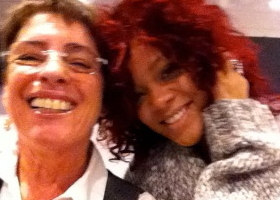
Originally published in Voice Council Magazine.
There are huge misconceptions about TV talent shows – says Lis Lewis.
We interviewed Lis Lewis who is a true coach-to-the-stars in L.A, with clients such as Britney Spears and Rihanna.
She has seen many of her students go through the talent show machine, so we ask her to spill…
The Fame Fades Quickly

Steve Brookstein singing
Steve Brookstein was the first ever X Factor winner. After some rows over his treatment on the show, he’s written an autobiography called Getting Over The X
Singers entering shows like The Voice, X Factor and American Idol believe they will gain tonnes of fans and become famous regardless of whether they win or not.
I have seen people come off the show after being top 5 and then go back to high school. They go back to being their regular self. No longer are they surrounded by constant activity and press attention.
For the past 6 weeks they have been under the microscope and under huge pressures. They experienced excitement and adrenaline and felt on top of the world. Then suddenly they are thrown back into their normal daily lives. It can be heart breaking.
There is nothing set up to help them adjust to this sudden change. They try to keep track with other people who were on the show with them. They often seek connection with their peers and fans.
During their time on the show they are required to develop their social media and constantly be on Facebook and Twitter. They have the opportunity to develop a big following online. The challenge is to maintain this once the show ends. But, unfortunately, this often doesn’t develop into anything.
Reality is Manipulated

Lis with Loren Allread from The Voice
Another big misconception about these shows is that it is actual reality. TV can be very manipulative. This is done for the sake of entertainment.
The shows are governed by law so they cannot fix the outcome/winner, but they can do an awful lot to effect it.
For example, if there are two singers singing the same song, they are both going to have to sing it in the same key. The producers are the ones who choose this key, so one singer is going to benefit and the other one may not.
There are many tactics like this: the producers change the song at the last minute, they change keys, they change arrangements. They can shake up the show’s direction or a contestant’s performance.
Producers Go on the Prowl

One Direction have achieved phenomenal success, despite finishing third on The X Factor.
There are a series of auditions. The first is the giant cattle call that we see snippets of on TV. After this there are producer auditions which are like call-backs. Some people skip the cattle call and go straight to the producer audition – and then there are people who skip even that!
This doesn’t necessarily govern who is in the finals. The singers can change radically as the show develops. Some people emerge as amazing raw talent, and others who start off as strong fall by the wayside. These developments cannot be manipulated and they’re exciting to watch.
The producers are scouting all the time on Facebook and Twitter. If they see an artist with a big social media following, they want to have that person audition for their show. After all, their job is to find great talent. They also scout voice teachers to get their best talent.
Remember that they are casting. When an email goes out searching for singers, it is often from an external casting company. They may want ‘the little girl with the big voice’ or ‘the country singer with a heart of gold’. They are casting characters, not just voices. If you are a loud rock singer and they’ve just cast that character, you won’t get the part.
It’s not about you, it’s about what they are looking for, and you have no idea what they’re looking for. A successful audition for you should be one you’re proud of, whether or not you get a call back.
Don’t Become a Victim
Some shows like to accept people because they aren’t good. They think it’s funny for the audience to see someone who is out of tune or performing badly. If I am training a student who wants to audition, I want them to be realistic about how the show could affect them if it shows them in the wrong light.
If I think a student has the potential to be out of tune, or not interesting enough, I’ve got to tell them. It scares me that they could be victimised. An experience like that could scar them. They should be clear eyed about their strengths and weaknesses.
A Culture of Singing
On a positive note, these shows have encouraged people who love to sing to take their singing seriously. In the past 10-15 years since these shows have been on air, more people than ever before have started taking lessons and singing at karaoke. That’s a fabulous development.
Some people may go to the big cattle call audition and not go any further. This doesn’t have to be a bad thing. They get the chance to perform, they meet other people like them and have a great time. How amazing to be in a room full of singers! They may have different backgrounds and skills, but they all have the same great love of singing. Music is a wonderful expression of our innermost feelings and experiences. Music is it’s own reward.
Since these shows have been on air, more people than ever before have started taking lessons and singing at karaoke. That’s a fabulous development.

Lis Lewis is a voice teacher and performance coach in Los Angeles, CA. She has been training recording artists for over 30 years. Learn more about her private voice lessons. She has also coached celebrities including: Miguel, Rihanna, Iggy Azalea, Bryson Tiller, Demi Lovato, and more. Lis is also the author of the books, “The Singers First Aid Kit” and “The Pop Singers Warm-Up Kit” both published by Hal Leonard.




